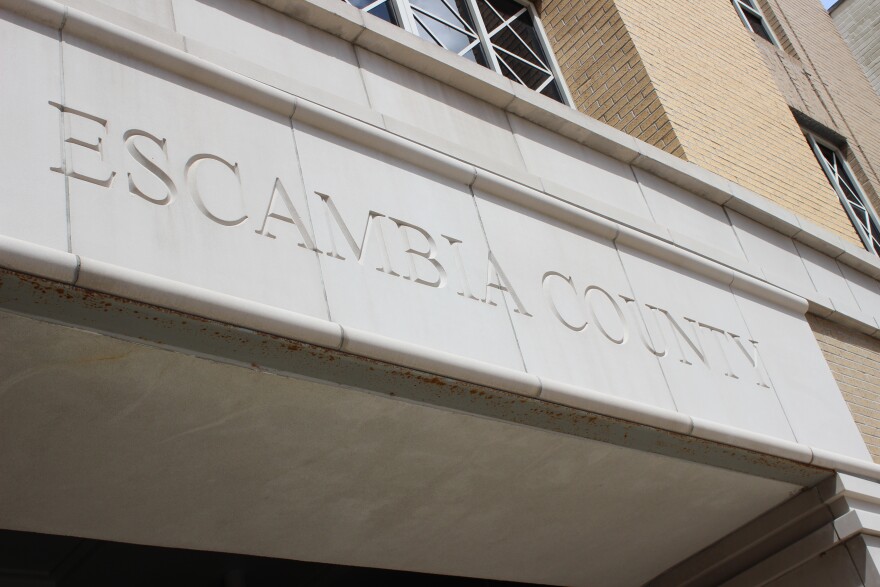A simmering fight between the Escambia Children’s Trust and the Escambia County Commission over roughly $1.1 million in unpaid tax-increment financing (TIF) boiled over last week — complete with a threat to put the Trust back on the 2026 ballot.
At the center of the conflict is whether the Children’s Trust should be exempt from paying tax increment financing, or TIF, to the county’s Community Redevelopment Agencies, special districts that reinvest growth in property tax revenue into improvements — like streetlights, sidewalks and affordable housing — in areas officially deemed “blighted.”
The Escambia Children’s Trust is one of several independent children’s services councils across Florida. It operates separately from county government, is governed by its own board, and is funded through a dedicated voter-approved property tax. The Trust provides grants to nonprofits and public agencies to support programs that improve outcomes for children and youth in areas like education, health, and safety.
Escambia County has several CRA districts, and because the Children’s Trust collects property taxes within the boundaries of some of these areas, state law requires it to contribute a portion of that revenue back to the CRAs through TIF.
The county argues that CRA infrastructure improvements benefit the same communities the Trust aims to serve. The Trust, however, contends the money, even if administered by the CRA, is legally required to go directly to youth-focused programs, including education, health, and job training.
This fight dates back to December 2023, when county auditors first flagged the Trust’s unpaid TIF for 2021–22, totaling $690,684. Despite a county directive in September 2024 ordering payment of $1.1 million across three years, the Trust paid only the 2023 increment of $443,341 and has withheld earlier amounts ever since.
“What we are actually asking from the Trust is to consider entering into an interlocal agreement that would simply allow us to ensure these monies are going towards their intended purpose… to fund programs and services that would improve the lives and wellbeing of children,” said Dr. Rex Northup, chair of the Children’s Trust.
A similar arrangement has been discussed with the City of Pensacola, which also collects TIF from the Trust but has proposed using those funds to support early-childhood initiatives rather than traditional infrastructure projects.
During last week’s commission meeting, Board Chair Mike Kohler led the pushback. He even warned that, should the Trust refuse to meet its TIF obligations, he would work to put the Trust’s own taxing authority back before voters in 2026.
“Our lawyers met with you, and we agreed, at least on our side, that we clearly have state statute on our side,” Kohler said. “We want 1.9% to help the lowest income communities in Escambia County, and you continue to want to push back and fight us. I don’t understand this.”
However, the rest of the board remains split. Commissioner Steve Stroberger sided with Kohler, favoring strict enforcement of the Trust’s TIF obligations. Commissioner Ashlee Hofberger took a more flexible stance, suggesting that infrastructure needs could instead be funded through the Local Option Sales Tax, preserving the Trust’s funds for children’s programming.
Commissioner Lumon May, who also serves on the Children’s Trust board, appealed for a collaborative solution.
“Let’s do what’s right for children, not what’s right for the Trust board or the County board,” May said.
Legal questions loom
Florida’s CRA districts have drawn increasing scrutiny at the state level. Some lawmakers have called for phasing out CRAs or halting the creation of new ones, citing concerns over transparency and misuse of funds. In Tallahassee this year, a house bill would ban any new CRAs and phase out existing ones by 2045, while a companion measure in the senate would instead tighten CRA spending rules but allow new districts under stricter oversight.
Proponents argue CRAs remain effective if properly managed. But if CRAs are eventually eliminated, the question of the Trust’s obligations could become irrelevant.
Looking Ahead
Trust attorney Meredith Bush signaled a willingness to negotiate.
“We believe it’s a win-win for the county and the Trust to enter into an interlocal” (agreement), Bush said.
A final decision was deferred until July 10.
For now, the fate of nearly half a million dollars, and the future of children’s programming in Escambia County, remains uncertain.


